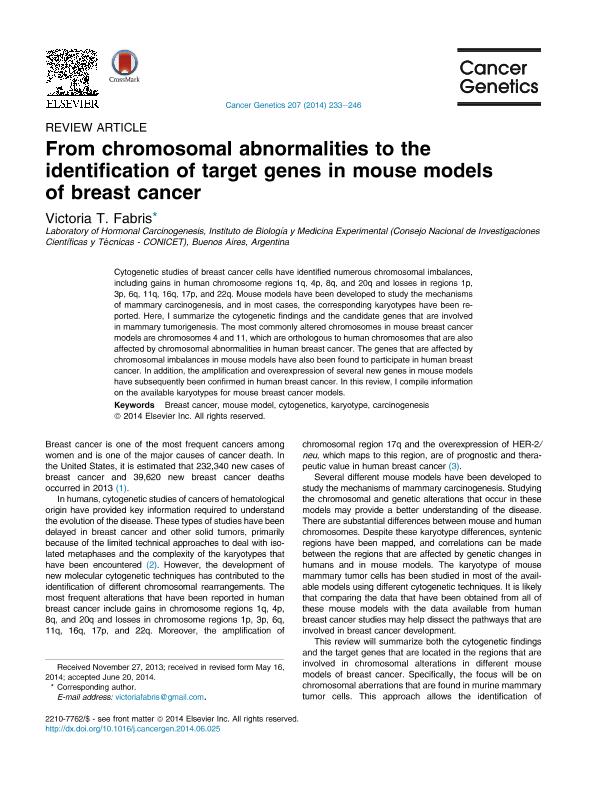Mostrar el registro sencillo del ítem
dc.contributor.author
Fabris, Victoria Teresa

dc.date.available
2016-07-26T15:35:53Z
dc.date.issued
2014-06-25
dc.identifier.citation
Fabris, Victoria Teresa; From chromosomal abnormalities to the identification of target genes in mouse models of breast cancer; Elsevier Inc; Cancer Genetics; 207; 6; 25-6-2014; 233-246
dc.identifier.issn
2210-7762
dc.identifier.uri
http://hdl.handle.net/11336/6684
dc.description.abstract
Cytogenetic studies of breast cancer cells have identified numerous chromosomal imbalances, including gains in human chromosome regions 1q, 4p, 8q, and 20q and losses in regions 1p, 3p, 6q, 11q, 16q, 17p, and 22q. Mouse models have been developed to study the mechanisms of mammary carcinogenesis, and in most cases, the corresponding karyotypes have been reported. Here, I summarize the cytogenetic findings and the candidate genes that are involved in mammary tumorigenesis. The most commonly altered chromosomes in mouse breast cancer models are chromosomes 4 and 11, which are orthologous to human chromosomes that are also affected by chromosomal abnormalities in human breast cancer. The genes that are affected by chromosomal imbalances in mouse models have also been found to participate in human breast cancer. In addition, the amplification and overexpression of several new genes in mouse models have subsequently been confirmed in human breast cancer. In this review, I compile information on the available karyotypes for mouse breast cancer models.
dc.format
application/pdf
dc.language.iso
eng
dc.publisher
Elsevier Inc

dc.rights
info:eu-repo/semantics/openAccess
dc.rights.uri
https://creativecommons.org/licenses/by-nc-nd/2.5/ar/
dc.subject
Breast Cancer
dc.subject
Mouse Model
dc.subject
Cytogenetics
dc.subject
Karyotype
dc.subject.classification
Genética Humana

dc.subject.classification
Medicina Básica

dc.subject.classification
CIENCIAS MÉDICAS Y DE LA SALUD

dc.title
From chromosomal abnormalities to the identification of target genes in mouse models of breast cancer
dc.type
info:eu-repo/semantics/article
dc.type
info:ar-repo/semantics/artículo
dc.type
info:eu-repo/semantics/publishedVersion
dc.date.updated
2016-06-15T19:08:28Z
dc.journal.volume
207
dc.journal.number
6
dc.journal.pagination
233-246
dc.journal.pais
Países Bajos

dc.journal.ciudad
Amsterdam
dc.description.fil
Fil: Fabris, Victoria Teresa. Consejo Nacional de Investigaciones Científicas y Técnicas. Instituto de Biología y Medicina Experimental (i); Argentina
dc.journal.title
Cancer Genetics
dc.relation.alternativeid
info:eu-repo/semantics/altIdentifier/doi/10.1016/j.cancergen.2014.06.025
dc.relation.alternativeid
info:eu-repo/semantics/altIdentifier/doi/http://dx.doi.org/10.1016/j.cancergen.2014.06.025
dc.relation.alternativeid
info:eu-repo/semantics/altIdentifier/pmid/25176624
dc.relation.alternativeid
info:eu-repo/semantics/altIdentifier/url/http://www.sciencedirect.com/science/article/pii/S2210776214001392
dc.relation.alternativeid
info:eu-repo/semantics/altIdentifier/url/http://www.cancergeneticsjournal.org/article/S2210-7762(14)00139-2/abstract
Archivos asociados
